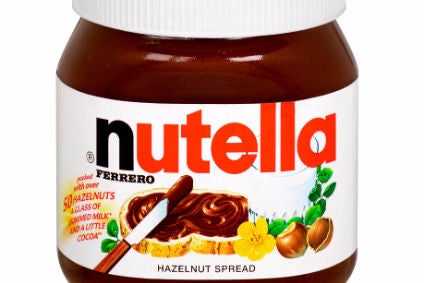
Ferrero has painted a bleak picture for its business in the UK should the country fail to reach a suitable trade agreement upon leaving the EU, with a potential increase in import tariffs and a divergence in labelling among the key risks to higher costs.
The maker of Tic Tac sweets and Nutella spreads also identified consistent food laws, smooth customs controls, safeguards of EU nationals working in the UK and access to priority markets as other areas of concern after Brexit. To avoid disruption, the company supports a transitional arrangement to give businesses time to plan sufficiently for any new UK-EU free-trade agreement (FTA).

Discover B2B Marketing That Performs
Combine business intelligence and editorial excellence to reach engaged professionals across 36 leading media platforms.
“It is vitally important for our business to avoid a cliff-edge,” the company said in findings of a study published today (12 December) by the Business Energy and Industrial Strategy Committee of the UK’s House of Commons, the lower house of its legislature. There is a “high-risk of disruption” from leaving the EU’s single market and customs union, Ferrero added.
Ferrero said the UK benefits from 53 FTAs secured by the EU around the world and argued after Brexit the country would need to maintain as many of those as possible to enable the company to import ingredients, and import and export finished products at no extra cost.
Under World Trade Organization rules, the EU imposes export tariffs of around 10% on Ferrero’s UK products and the Italy-based giant warned of serious implications if such levies were applied to imports.
“If the UK were to replicate these tariffs on imports, this would be one of the biggest single sources of cost faced by our company and, in all likelihood, by our consumers.”

US Tariffs are shifting - will you react or anticipate?
Don’t let policy changes catch you off guard. Stay proactive with real-time data and expert analysis.
By GlobalDataFerrero, which has a UK turnover of GBP483m (US$645.5m), said it would also face a 10% increase in costs from any changes in labelling requirements should the country leave the EU, pointing out products sold in the UK and Ireland carry the same packaging.
“Were UK and EU labelling law to diverge such that future labelling schemes were not compatible, the task of repackaging products from one market to the other could increase costs by as much as 10% and reduce the number of different products on the market,” the company said.
Consistent food laws would also be a key requisite so products from the EU can remain on UK shelves and vice versa, Ferrero said, similar to regulatory arrangements seen in Australia and New Zealand, and the EU’s agreement with Switzerland. One of the attractions of acquiring UK confectionery maker Thorntons – in 2015 – was the “prospect of exporting an iconic British brand around the globe”, Ferrero added.
Smooth customs controls will be needed to prevent any delay in the movement of goods, which Ferrero stressed would otherwise increase costs and possibly affect the freshness of its goods. As a case in point, the company said its products sold in the UK are made in locations across Europe. And inversely, 80% of its Tic Tac output from the plant in Cork, Ireland, is exported to the trade bloc.
Ferrero said safeguards would need to be put in place for its employees, with 7% of the workforce comprising EU nationals, which rises to 20% when head office roles are included.
The company identified its top priorities for new export trade deals following Brexit as the EU, Australia, the US, Canada, China, Hong Kong, South Africa and the United Arab Emirates, And for import, the EU, Peru, Ghana, Cote d’Ivoire, Brazil and the US.
“Like other companies in the sector, Ferrero’s success in the UK owes much to the EU single market and customs union, and the ability to easily move our products across borders, source ingredients and raw materials from a range of countries, and the ability of our staff to work freely across Europe,” Ferrero said.
The submission was one of 16 made to the BEIS committee, which have been published ahead of a session tomorrow at which representatives from Nestle and from industry organisations including The Food and Drink Federation will discuss the impact of Brexit on the food sector.





